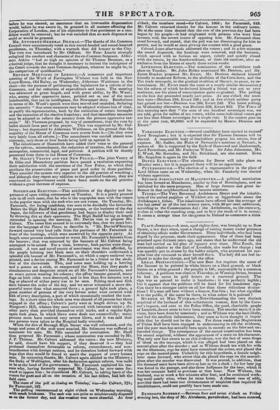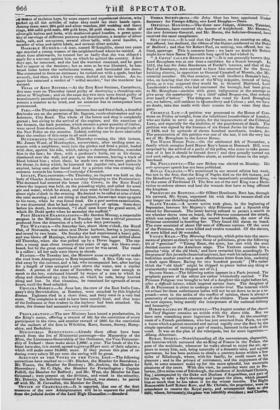Exams:stye ROBBERY.—Between four and seven o'clock on Friday evening last,
the shop of Mr. Abrahams, pawnbroker, had been entered, Aett Mertes of Skeleton keys, by some expert and experienced thieves, who peeked tip all the articles of value they could lay their hands upon. Among them were 204 gold and silver watches, 500 wedding and fancy rings, 400 solid gold seals, 400 gold keys, 30 gold chains, two dozen of silver-gilt knives and forks, with mother-of-pearl handles) a great quan. 'city of eat-rings of different patterns and descriptions, a number of silver table, salt, and tea-spoons, several silver bells, with coral handles, a number of wine and spirit labels, and several silver articles. HORRIBLE MURDER.—A man, named M`Laughlin, about two years ago married a young woman of the neighbourhood where he resided. A short tine afterwards, he treated her so badly that she was obliged t apply for a warrant against him, on which he quitted the country. A few days ago, he returned, and she had the warrant executed, and he gave bail to appear at the Sessions ; but as soon as he was liberated, he has- tened home before the unfortunate woman, and barricaded the doors. She attempted to force an entrance; he rushed out with a spade, beat her severely, and then, with a heavy stone, dashed out her brains. An in. quest has returned a verdict of " wilful murder," but the murderer has escaped. TRIAL OF KENT RIOTERS.--At the East Kent Sessions, Canterbury, five men were on Thursday found guilty of destroying a thrashing-ma- chine at Wingham ; and on the same day two men were found guilty of tumultuously assembling and assault, in the parish of Ruckinge. There remain a number to be tried, and no sentence has in consequence been pronounced.
FIRE.—On Thursday morning, between four and five o'clock, a dreadful fire broke out on the premises of Mr. Ingram, rustic-chair-maker and up- holsterer, City Road. The whole of the fiouse and shop is completely gutted ; but owing to the arrival of the engines, and the exertions of the firemen, the back premises, which contain a great quantity of timber, were saved from destruction. Much praise is due to the promptitude of the New Police on the occasion. Indeed, nothing can be more admirable than the conduct of this corps in all such cases. DETERMINED SUICIDE.—On Thursday evening, the 18th instant, Mr. James Wood, of Huntingdon, nurseryman, after settling some ac- counts with a neighbour, went into the garden and fired a pistol, loaded with shot, against his side, which, taking a slanting direction, wounded him in the face; he then, with a gardener's knife, cut at his throat, clambered over the wall, and got upon the common, leaving a track of blood behind him ; when there, he made two or three more gashes in his throat, in doing which, he lacerated the jugular vein, and instantly expired, being soon after found dead by a person who was crossing the common towards his home.--Cambridge Chronicle.
LoeKIT, PHILOSOPHER.—On Thursday, an inquest was held on the body of Charles Anderson, late a turnkey belonging to the Penitentiary. The deceased had entered the house (the Crown, in the Kent Road) where the inquest was held, on the preceding night, and called for some gin and water, which he drank, and then went to bed in the same house, about eight o'clock in the evening. He desired to be called at nine o'clock the next morning ; and not rising at that:time, the servant went up again to his room, when he was found dead. On a post mortem examination, it was discovered that he had taken a quantity of opium- Some days before his death, he exclaimed, "I shall soon know the grand secret, of which Dr. Dodd spoke when he ascended the scaffold." Pose' MORTEM Exasmearsosts.Mr. Gordon Murray, a respectable surgeon in the Minories, died on Tuesday last from a trivial puncture produced from the dissection of a body a few days previously. THE WEATHER.—On Saturday last, about three o'clock, the Royal Oak, of Newcastle, was taken into Dover harbour, having a jurymast, and towed by two boats. On Sunday she had experienced a heavy gale, and was blown off Hastings, where she lay some time, and drifted about till Thursday, when she was picked up by a Dover lugger. The cap- tain, a young man about twenty-three years of age, was blown over- board, but by the great exertions of the crew he was saved. The vessel is a collier ; all her sails were blown to shreds.
Feoons.—On Tuesday last, the Monnow arose so rapidly as to make the road from Abergavenny to Ross impassable. A Mrs. Cole was car- ried away by the current, and a lad, who accompanied her, after having for a length of time occupied a spot above the water, met a similar death. A person of the name of Saunders, who was near enough to speak to the boy, extricated himself by means of a tree to which he clung and clambered up ; the horse, on which he rode, being hurried along and lost. In that situation, he remained for upwards of seven hours, until the flood subsided.
CHOLERA Monsus.—In June last, the crew of the East India Com- pany's ship Berwickshire, at Bombay, were attacked by this frightful disease. Eighteen died in a short time, and forty were in a very bad state. The complaint is said to have been merely local, and that none of the Indiamen or free traders in the harbour had been attacked. On shore, the disease had assumed a very mild character.



























 Previous page
Previous page